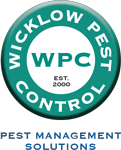Have wasps invaded your garden this summer?
The recent good weather has resulted in wasp infestations on the rise in Wicklow. Wasps begin to appear in late April onwards, with their peak time being late summer early autumn. In the winter months in Ireland, the queen wasps will be in hibernation while the worker wasps will have died off. In spring, the queen will come out of hibernation and start forming new nests. Wasps will construct nests from chewed up bark and dried timber using their own saliva.
If a wasp’s nest is built near your property, it can cause nuisance to homeowners or passers-by. If a wasp’s nest is left untreated it can become the size of a football, with a colony as big as 25,000 wasps.
Pro tip!
Check for nests early in the year. Check the most likely spots for wasps to build their nests such as garages, sheds, lofts, under eaves, vents, on your balcony and even under your decking! These should all be checked in Spring while nests are still small – around the size of a golf ball. A nest the size of a golf ball is much easier to deal with than when it grows to the size of a football in the late summer.
We recommend avoiding DIY products for wasps nest removal.
As we know wasps can have an aggressive nature. If you try to DIY remove a wasps nest, it could result in thousands of very angry wasps. Whoever the unlucky people nearby this angered wasp nest are, are open to receiving major stings. We at Wicklow Pest Control would advise you to call the professionals, who have protective clothing to wear while removing a wasps nest and we will use professional insecticides that are not available to the public and are highly effective.
A pest controller will normally apply an insecticide near the entrance of the nest. The wasps will bring the chemical into the nest. After a couple of days the wasps will die from the dose of pesticide. If a wasps nest is treated correctly, it will start to die off within an hour. We advise customers to keep away from the area around the treated wasp nest until no wasp activity is seen. It may also be necessary to keep doors and windows shut near the nest after it has been treated.
‘Do wasps return to the same nest each year?’
No, all worker wasps die off each winter, with a few queens remaining. The queens will hibernate over the winter, and although this might be in an existing nest, the queen will build a new nest each spring. This may be close to an existing nest which is the reason it is not uncommon to find an active nest surrounded by a few older nests.
One of the most common places for queen to start her nest is at the shed, boiler house, dogs kennel even under a kid’s trampoline.
- Nests are light grey beige colour with papery appearance
- Once indoors, wasps will build nests in sheltered locations with easy access to outside such as lofts, garages and wall cavities
- Nests will also be found in roof spaces, airbricks, cavity walls, garden sheds, trees and flowerbeds if left undisturbed
Preventing Wasps and their nests
- Housekeeping – keep outdoor eating areas clean to minimize a food source for wasps. Regularly removing rubbish and keeping bins clean and closed is important.
- Seal Gaps and Cracks – in exterior walls, roofs, and foundations to prevent wasps from entering. Deny wasps access into your property by keeping doors shut
- Installing Mesh Screens – on windows, doors, and vents to keep wasps out while maintaining airflow.
- Removing Potential Nesting Sites – such as woodpiles and tall grass – through the summer check your BBQ!
- Eliminate Water Source – as wasps need water for their survival and will be attracted to birdbaths, pet water dishes or leaky faucets.


